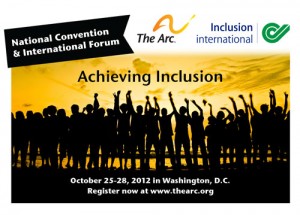Get Healthy With HealthMeet™
HealthMeet™, a project of The Arc funded through a cooperative agreement with the Centers for Disease Control and Prevention, works to reduce health disparities and increase the longevity and quality of life for people with intellectual disabilities. To accomplish this, we are planning free community-based health screenings and referrals for people with intellectual disabilities along with training and education for individuals, families, professionals, medical providers and other caregivers to raise public awareness of the health issues that impact people with ID across the country.
Check out our website for information about the program, resources, and news about possible Healthmeet™ activities in your community. In the meantime, we invite you to join us for an online educational series tackling specific topics related to health promotion among people with intellectual disabilities. There will be a variety of Webinars over the coming months, beginning with the sessions below. Bookmark our page and check back often for new sessions as they are developed.
Weight Loss for Individuals with Disabilities
Monday, November 19, 2:00 p.m. – 3:00 p.m. ET
Expert guest speakers Richard and Muriel Saunders from the University of Kansas discuss effective weight loss plans in overweight adults with disabilities. This webinar will go into detail about methods, results and lessons learned in creating an effective weight loss program. These research-based programs have been proven to have great success in helping people with disabilities to keep the weight off and decrease obesity-prone health disparities. We will discuss barriers to eating healthy and strategies to increase consciousness of making healthier long-term eating decisions and how to track that progress. Join us to hear more about this important topic.
UIC HealthMatters™ Curricula
Tuesday, November 27, 2:00 p.m. – 3:00 p.m. ET
The HealthMatters™ Program from the University of Illinois at Chicago (UIC) offers various health-related trainings and curricula to help self-advocates, caregivers, families, and health care providers promote health, prevent disease, and foster community engagement of people with disabilities. Different programs are tailored for various audiences including people with disabilities, caregivers, families, and health care providers. We welcome Beth Marks, RN, PhD and Jasmina Sisirak, PhD, MPH from the Department of Disability and Human Development at UIC to share information regarding the various trainings that are associated with HealthMatters™ Program. One of the trainings will be utilized by The Arc’s five HealthMeet™ pilot sites to develop and implement a health promotion program in their communities. Please join us to find out more about these exciting trainings and programs and how they can be helpful in your community.









